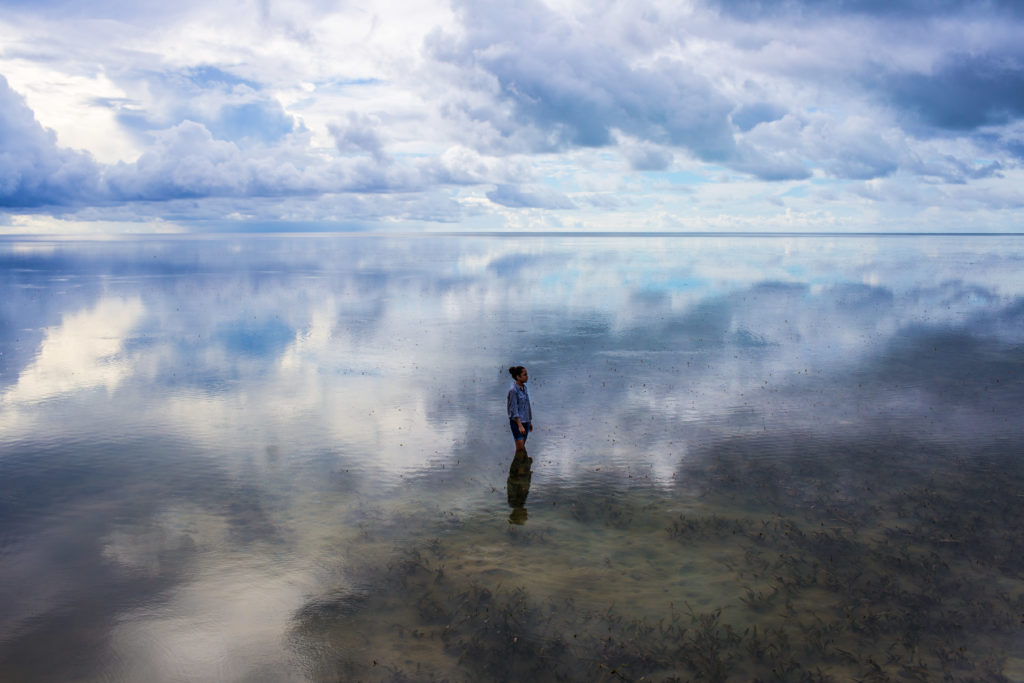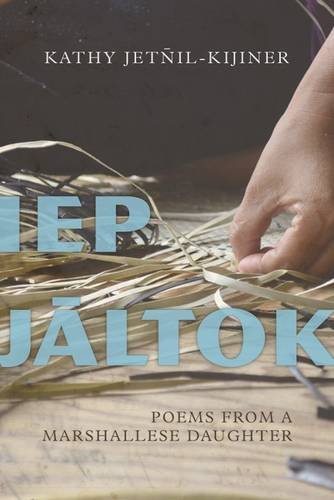Note: this was originally posted for prel.storytellers.org.
This past week I’ve been in Palau attending the Pacific Education Conference where I presented on “Activating Youth Voices for the International Stage” alongside my friend, photographer Daniel Lin from the non-profit PREL (Pacific Resources for Education and Learning).
After the presentation, a woman came up to me. She said she had watched me perform my poem, “Dear Matafele Peinam.” She asked me how I could make a promise like that, to my daughter and my granddaughter, that they wouldn’t have to move, “when your islands are clearly doomed.”
I was packing my things, and I watched the reaction in my body. Interesting enough, my body was a lot calmer than I expected. Only a slight raise in pulse, no blood in the eyes, no racing heartbeat.
I said, slowly, “Because there’s still time. There are still studies out there that prove we can still turn this ship around. Honestly, I disagree. I don’t think we’re doomed.”
She says, “But don’t you think you’ve been living there long enough? I just think you’ve all been there long enough and there’s plenty of other lands and islands to move to. It’s time to move on.”
I said, “Our people have been living there for hundreds, thousands of years –“
She cut in “and maybe that’s enough.” She went on to explain that there’s plenty of land in other islands, even here in Palau that we could move to.
“But that wouldn’t be on our own land. We would be outcasts here, burdens, refugees.” She waved her hands dismissively at me.
“I married an islander and made a life here, plenty of islanders marry other islanders and move away and they’re able to continue living their life.”
“But you’re talking about more than 60,000 people.” I also added that climate change wouldn’t just destroy our land, it would destroy Palau’s – it would destroy all of the Pacific. It would reach the whole world. That’s been another crucial message of mine. But she waved this away.
“Well look at the movie Moana” – something inside me shriveled – “they were voyagers and they just needed to continue voyaging. Perhaps that’s what your people need to do – they need to continue voyaging.”
I said, “With all due respect, that’s a Disney movie.”
She shrugged and said, “I just think there’s no other choice – you’re doomed.”
I don’t even remember exactly how we wrapped up the conversation. She basically repeated herself, like a horrible broken record. I didn’t rush it, I continued packing my things. I forced myself to speak slowly, calmly. “I see where you’re coming from. And I see your point. But I think we’ll just have to agree to disagree.”
She shrugged. Said ok and left.
Here I am a few nights later, and I can’t sleep thinking about this conversation.
The fact is – it does raise doubts that have always been there in the back of my mind.
Is this the right course of path? Just two months ago I emailed a friend telling him I was attending a 1.5 conference held by Rhodes Scholars in London to see if he’d like to meet up. This friend, who is older and an artist who’s been doing quite a lot of art work for climate action, emailed me a quick note saying he was out of town. He also added, rather dismissively, that “there’s no point in the conference – sorry to say there’s no way we’ll reach 1.5 at this rate.” It hit me hard. He might as well have also said our islands are doomed.
Why are we fighting? Why am I fighting? For such tiny strips of land – land that doesn’t have particularly good soil. I can’t even grow a damn mango tree on our sandy soil. It’s a parched sort of soil that isn’t giving. If anything, it’s downright stubborn, even selfish. So why fight for it?
For the past three months, I’ve been giving non-stop poetry workshops, presentations, and performances on both climate change and nuclear testing – two issues bigger than myself, my nation, bigger than hyperbole, with no easy solution in sight. I spent a week covering 5 different public middle schools and high schools in Portland Oregon, giving presentations and facilitating poetry workshops on climate change. Then I gave a workshop and presentation on climate change and poetry to Rhodes Scholars in London. After this, I facilitated poetry workshops with Marshallese middle school students in Ejit, Majuro, and Hawaii, on the topic of nuclear testing. After that, presentations on climate change in Australia National University. Then fundraising for our organization Jo-Jikum through presentations on climate change in Japan covering as many as 15 different events, and 700 people. Last week was my latest, with poetry workshops to a small group of Palauan high school students who were also conducting studies on rhinoceros beetles and food security.
Perhaps I am burned out. A rest would help. I miss my daughter.
I also wonder how many consider me naïve, irresponsible for instilling false hope, for focusing on this issue above others. I don’t know if I’m leading others down the wrong path. I think that’s what scares me most. I don’t know for sure that we’ll save our islands. There may be a time when I’ll have to admit defeat. I envision that moment, when I’ll begin packing the details of our island into my body. When I’ll force myself to remember that this is what the sea grass feels like. This is what sky looks like against ocean. This is an overcast day, the sun brushing against my neck. That the water can be so much warmer than I thought.
Thing is, that moment isn’t here. Not yet. And maybe I’m like the soil from my land. I’m stubborn. I’m not willing to give up more than I have to.
I will say this. Connection to land doesn’t just happen anywhere. It doesn’t happen magically overnight. Our people studied the land for thousands of years to understand it. And not just the land, but the ocean as well. If you don’t have that connection – then it’s hard to explain and empathize with us. Maybe that’s the issue.
All I know is, I’d rather go down fighting. This I know for sure. I’d rather keep fighting till the very end – until we are absolutely sure that there is nothing else we can do. Until then I’ll face the future. Head on.

